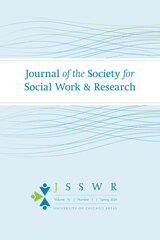4 books about Party Competition
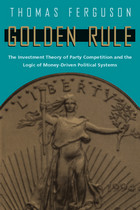
Golden Rule
The Investment Theory of Party Competition and the Logic of Money-Driven Political Systems
Thomas Ferguson
University of Chicago Press, 1995
"To discover who rules, follow the gold." This is the argument of Golden Rule, a provocative, pungent history of modern American politics. Although the role big money plays in defining political outcomes has long been obvious to ordinary Americans, most pundits and scholars have virtually dismissed this assumption. Even in light of skyrocketing campaign costs, the belief that major financial interests primarily determine who parties nominate and where they stand on the issues—that, in effect, Democrats and Republicans are merely the left and right wings of the "Property Party"—has been ignored by most political scientists. Offering evidence ranging from the nineteenth century to the 1994 mid-term elections, Golden Rule shows that voters are "right on the money."
Thomas Ferguson breaks completely with traditional voter centered accounts of party politics. In its place he outlines an "investment approach," in which powerful investors, not unorganized voters, dominate campaigns and elections. Because businesses "invest" in political parties and their candidates, changes in industrial structures—between large firms and sectors—can alter the agenda of party politics and the shape of public policy.
Golden Rule presents revised versions of widely read essays in which Ferguson advanced and tested his theory, including his seminal study of the role played by capital intensive multinationals and international financiers in the New Deal. The chapter "Studies in Money Driven Politics" brings this aspect of American politics into better focus, along with other studies of Federal Reserve policy making and campaign finance in the 1936 election. Ferguson analyzes how a changing world economy and other social developments broke up the New Deal system in our own time, through careful studies of the 1988 and 1992 elections. The essay on 1992 contains an extended analysis of the emergence of the Clinton coalition and Ross Perot's dramatic independent insurgency. A postscript on the 1994 elections demonstrates the controlling impact of money on several key campaigns.
This controversial work by a theorist of money and politics in the U.S. relates to issues in campaign finance reform, PACs, policymaking, public financing, and how today's elections work.
Thomas Ferguson breaks completely with traditional voter centered accounts of party politics. In its place he outlines an "investment approach," in which powerful investors, not unorganized voters, dominate campaigns and elections. Because businesses "invest" in political parties and their candidates, changes in industrial structures—between large firms and sectors—can alter the agenda of party politics and the shape of public policy.
Golden Rule presents revised versions of widely read essays in which Ferguson advanced and tested his theory, including his seminal study of the role played by capital intensive multinationals and international financiers in the New Deal. The chapter "Studies in Money Driven Politics" brings this aspect of American politics into better focus, along with other studies of Federal Reserve policy making and campaign finance in the 1936 election. Ferguson analyzes how a changing world economy and other social developments broke up the New Deal system in our own time, through careful studies of the 1988 and 1992 elections. The essay on 1992 contains an extended analysis of the emergence of the Clinton coalition and Ross Perot's dramatic independent insurgency. A postscript on the 1994 elections demonstrates the controlling impact of money on several key campaigns.
This controversial work by a theorist of money and politics in the U.S. relates to issues in campaign finance reform, PACs, policymaking, public financing, and how today's elections work.
[more]
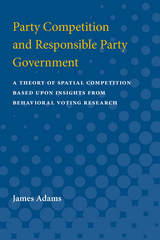
Party Competition and Responsible Party Government
A Theory of Spatial Competition Based Upon Insights from Behavioral Voting Research
James Adams
University of Michigan Press, 2001
In countries with multiparty political systems, we assume--if the system is going to work--that parties have relatively stable positions on policy, that these positions diverge, and that voters make choices based on policy preferences. Yet much of the research on voter behavior and party competition does not support these assumptions.
In Party Competition, James Adams applies the insights of behavioral research to an examination of the policy strategies that political parties (and candidates) employ in seeking election. He argues that vote-seeking parties are motivated to present policies that appeal to voters, whose bias toward these policies is based in part on reasons that have nothing to do with policy. He demonstrates that this strategic logic has profound implications for party competition and responsible party government.
Adams's innovative fusion of research methodologies presents solutions to issues of policy stability and voter partisanship. His theory's supported by an in-depth analysis of empirical applications to party competition in Britain, France, and the United States in the postwar years.
Party Competition and Responsible Party Government will appeal to readers interested in the study of political parties, voting behavior and elections, as well as to scholars specializing in French, British, and American politics.
James Adams is Assistant Professor of Political Science, University of California, Santa Barbara.
In Party Competition, James Adams applies the insights of behavioral research to an examination of the policy strategies that political parties (and candidates) employ in seeking election. He argues that vote-seeking parties are motivated to present policies that appeal to voters, whose bias toward these policies is based in part on reasons that have nothing to do with policy. He demonstrates that this strategic logic has profound implications for party competition and responsible party government.
Adams's innovative fusion of research methodologies presents solutions to issues of policy stability and voter partisanship. His theory's supported by an in-depth analysis of empirical applications to party competition in Britain, France, and the United States in the postwar years.
Party Competition and Responsible Party Government will appeal to readers interested in the study of political parties, voting behavior and elections, as well as to scholars specializing in French, British, and American politics.
James Adams is Assistant Professor of Political Science, University of California, Santa Barbara.
[more]
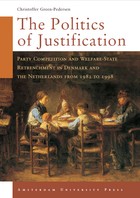
The Politics of Justification
Party Competition and Welfare-State Retrenchment in Denmark and the Netherlands from 1982 to 1998
Christoffer Green-Pedersen
Amsterdam University Press, 2003
Christoffer Green-Pedersen's insightful examination of political party strategy in Europe reveals strong links between party consensus and policy retrenchment, arguing that the former allows governments to frame retrenchment in a way that justifies it to the electorate. In the Netherlands, Green-Pedersen shows, such consensus emerged in the mid-1980s, allowing the government to implement a number of welfare retrenchments; in Denmark, consensus did not emerge until the Social Democratic Party re-entered government in 1993, leading to less welfare-state retrenchment than in the Netherlands.
[more]
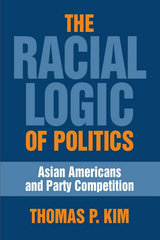
The Racial Logic of Politics
Asian Americans and Party Competition
Thomas P. Kim
Temple University Press, 2006
As he systemically studies the barriers that Asian Americans face in the electoral and legislative processes, Thomas Kim shows how racism is embedded in America's two-party political system.Here Kim examines the institutional barriers that Asian Americans face in the electoral and legislative processes. Utilizing approaches from ethnic studies and political science, including rational choice theory, he demonstrates how the political logic of two-party competition actually works against Asian American political interests. According to Kim, political party leaders recognize that Asian Americans are tagged with "ethnic markers" that label them as immutably "foreign," and as such, parties cannot afford to be too closely associated with (racialized) Asian Americans. In publicly repudiating Asian American efforts to gain political power, Kim asserts, party elites are making rational, strategic calculations.Although other commentators have blamed the diversity of the Asian American population for its lack of political success, Kim argues convincingly that race itself is the chief barrier to political participation—and it will not be overcome simply by electing or appointing more Asian Americans to political office.
[more]
READERS
Browse our collection.
PUBLISHERS
See BiblioVault's publisher services.
STUDENT SERVICES
Files for college accessibility offices.
UChicago Accessibility Resources
home | accessibility | search | about | contact us
BiblioVault ® 2001 - 2024
The University of Chicago Press



